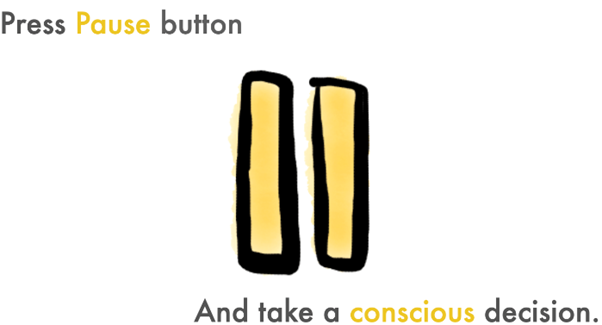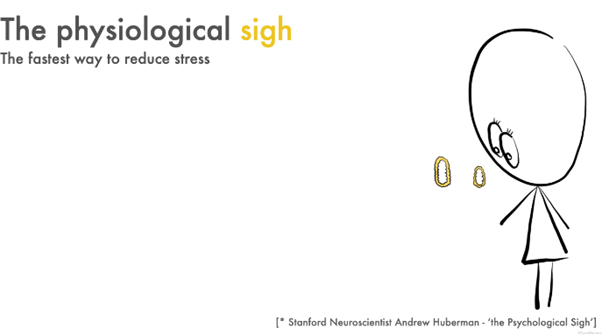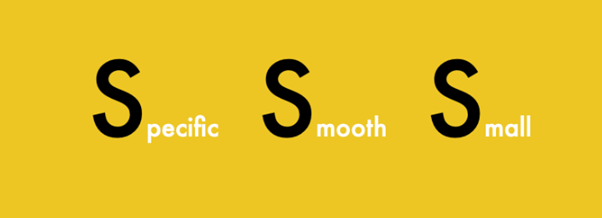13.02.2025
The Brainfix Series 4 - Press the pause button

In the previous episodes, we explored how Brainflix works. We noticed that our personal assistant Nic is doing a great job in creating and running automatic programs to preserve energy.
And we discovered that our unconscious brain takes a lot of shortcuts to cope with the complexity of the world. We have a lot of biases that lead to misjudgment of certain situations and behaviour that we’re maybe not really happy with (like eating too much high-calorie food or sticking to the status quo because that feels more safe).
Maybe you also recognise this series in your own Brainflix. You arrive at work, open your laptop, and start answering emails. It seems like a normal routine, but before you know it, you've lost control of your day because most emails are requests from other people which you try to solve. During that same day, you have to attend 1 or 2 meetings (or more - for some people, attending meetings is their day-job) while your to-do list is growing. And by the end of the day, you feel frustrated and stressed out about all the things you haven't been able to finish.
That might be a program you're not fond of and wish to alter. The initial step in any change you seek in life is to become aware of the habit. Without this awareness, changing it is of course impossible because you don’t know that it happens.
Once you recognize a habit leading to undesirable outcomes, you gain the power to make adjustments. Taking a short break can be an effective approach.
PRESS THE PAUSE BUTTON
This pause grants us the opportunity to consciously step back when we notice ourselves trapped in an unwanted routine, empowering us to actively change our behaviour.
For instance, rather than reflexively diving into emails upon reaching the office, pause for a moment. Ask yourself: Is this truly the best use of my time right now? Consciously distance yourself from the task and determine your objectives. Perhaps you aim to make progress on a specific project. Allocate 10 minutes to create a prioritised list of tasks for the day and dedicate the first two hours to that project. By making these mindful choices, you'll notice a shift in your day. Less stress, heightened focus on essential tasks, and a gratifying sense of control over your actions by day's end.
Of course, unexpected distractions may arise, such as phones ringing or colleague interruptions. However, each small step toward seizing control of your day diminishes stress.
P.S.: A technique that has proven effective for me is to allocate 5 minutes - setting a timer - at the beginning of the day to quickly skim through emails. Without this, I tend to feel restless, fearing I might miss an urgent email or speaking request. However, in 90% of cases, the emails are not urgent nor important. Allowing myself 5 minutes to check my emails lets me postpone responding until later in the day.

🛑 How to avoid P.A. Nic? 🧘♂️
If taking a pause is so easy, why don't we do it more often? And why do we still have so many habits that we're not happy with? It all comes down to the action we take after taking such a break. Sure, we can become aware and momentarily distance ourselves from the behaviours we no longer want. But what do we do next? More often than not, we take an action that is either too vague, too complex, or too big. We want to change everything all at once, and we go about it in a difficult and often nonspecific manner.
What happens then? Our personal assistant Nic will get into P.A.Nic - he freaks out because the new action or habit that we want to activate is too vague, too complex or too big. He doesn't know what to do, so he quickly reverts back to familiar behaviour, to automatic patterns.
The next episodes will delve into precisely those themes. How can we ensure that Nic doesn't panic? Can we make things more specific? Can we make things smoother? And can we break it down into super small steps?
🌬️ The physiological sigh 😌
To become more conscious of the moments when you need to take a break, I would like to introduce you to neuroscientist Dan Huberman who has a simple breathing method to reduce our stress. Dan has extensively studied the impact of breathing on our physiology and mental well-being. He introduced the concept of the physiological sigh, which is a natural, deep breath that helps regulate our respiratory system and reduce stress.
The physiological sigh typically involves taking a deep breath in through the nose - immediately followed by another short inhale- allowing the lungs to fully expand. And then exhaling slowly and completely through the mouth. This double inhalation followed by a prolonged exhalation triggers a relaxation response in the body, helping to lower heart rate, reduce muscle tension, and promote a sense of calmness and relaxation.

🌬️ Sssssss...... 🫁
The beauty of the physiological sigh lies in its simplicity and accessibility – it can be performed anytime, anywhere, and requires no special equipment or training. For these reasons, it's an excellent tool to support our conscious breaks when aiming to change a certain habit.
To tailor it for the Brainflix series, I suggest a small adjustment: instead of simply exhaling through the mouth, try exhaling while making the 'sss' sound. This simple tweak can help you recall the three key elements to make change a little easier.
The 'sss' represents Specific, Smooth, and Small. By incorporating these principles into your life when attempting to change a habit or improve the success rate of your change project, you may find the process more manageable and effective.

💭 Sssss ... A moment of reflection 🌟
So... discover your specific, smooth and small changes today: Choose one small habit you want to adjust and make a plan to achieve it. Remind yourself that every small step forward can make a difference in the success of your changes.
And don't forget to breath...sssss......!
Cheers,
Nic (aka Cyriel)
====
Hi, I’m Cyriel - international speaker on 'Making Change Simple'
Change is constant and often scary, but it doesn’t have to be. I bring a simple perspective to help leaders and teams tackle change confidently. Through practical insights, interaction, and humor in my keynotes, you can turn the fear of change into opportunity.
Don’t mind the change. Change your mind.
cyrielkortleven.com

